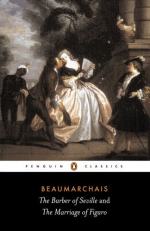|
This section contains 11,817 words (approx. 40 pages at 300 words per page) |

|
SOURCE: “The Currency of Exchange in Beaumarchais' Mariage de Figaro: From the ‘Master Trope’ Synecdoche to Fetish,” in Eighteenth-Century Studies, Vol. 25, No. 1, Fall, 1991, pp. 57-84.
In the following essay, Pucci argues that Beaumarchais's use of changing values and the loss of aristocratic privilege in The Marriage of Figaro transforms the play from a mere light comedy.
The importance of the droit de seigneur in Beaumarchais' Mariage de Figaro lies in its staging as an avowed anachronism and simultaneous translation from ritual act into an economy of monetary exchange. Such transformation is introduced from the very outset in the opening remarks of the play. In Act I, scene 1, Suzanne, first lady-in-waiting of Count Almaviva's wife, apprises her fiancé Figaro of Almaviva's designs on her in an allusion to the “ancien droit de seigneur.”1 Indeed, Suzanne reveals the conversion of this “former” ritual in the metaphor of its new economy...
|
This section contains 11,817 words (approx. 40 pages at 300 words per page) |

|


